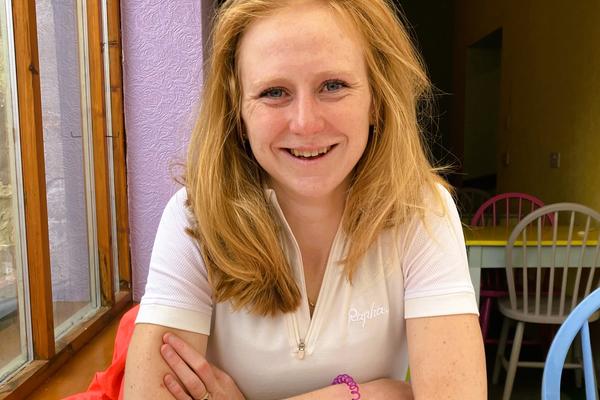Egyptologist Rachel Drapper
We caught up with AMES alumna Rachel Drapper, who matriculated in 2012 with a BA degree in Egyptology. Now an entrepreneur and CEO, Rachel told us how she took the plunge to study Egyptology, her life in Oxford, and how studying an AMES degree can set you up for a varied and interesting career.
Can you tell us a bit about what you had been interested in doing at university throughout secondary school and how you eventually settled on Egyptology?
I studied History, English Literature, Maths and Biology, so a very generalist set of subjects. I was very into history and literature, and I knew that I liked Ancient Egypt - I didn’t have a ‘destined passion’ from a young age like other people, but I knew that it was something that interested me. When I was in Sixth Form my school offered a trip to the British Museum to see the Book of the Dead, and that was when I realised I had more than a regular interest. Everyone else had already finished the exhibition, and I was still in the first room, reading every sign. I remember being fascinated by the one scroll that hadn’t been unrolled - thinking to myself why had it been left like that? What mysteries lay inside? Later on, I found out that my professor at Oxford was a curator for the exhibition, and he told me how problematic it had been for them. I was very struck by the feeling of things coming full circle!
The summer after year 12, I took part in a UNIQ summer course. I hadn’t originally applied for Egyptology as it clashed with a biology field trip in school but from my application the organisers recommended that it would be a better fit for my interests. I eventually managed to convince my school to let me attend. It was five days experiencing what it was like to be a student - I loved the subject work, staying in a college and the overall city experience. By the end of it, I was sold on Oxford and Egyptology, hook, line and sinker!
What was it like applying for Oxford and other universities in general?
I was the first generation in my family to go to university. Though my parents hadn’t been to university themselves, they were hugely supportive of me going and my decision to study Egyptology. We visited lots of universities on open days, and a comment by a professor at Birmingham stuck with my dad in particular: university is a time to study the subject you are interested in, not just the one that matches the job you want to do at the end of it. They both encouraged me to study whatever I wanted to study, and I am incredibly grateful for that.
At Oxford, I came on a course open day and had a look around the colleges that offered Egyptology. I chose Queen’s, and then attended interviews there. I had been told that I would interview at another college, but at the end of the day my name wasn’t on the list, leading me to think I had not been accepted. But then my offer came through, and the rest is history!
How did you find your undergraduate degree? What were your favourite parts?
Egyptology was amazing, I look back on it with such fond memories. A lot of people describe Egyptology as a very “niche” subject, but I tend to disagree. The reason it was so attractive to me is because it is much broader and more interdisciplinary than studying History or English Literature. The course was a real mixture - of course, there was the history side of things, reading and writing essays, but also civilisation studies, object classes, and the language component. From the outside, it might have looked like I was studying a homogenous culture, but that definitely wasn’t the case, in fact Egyptian culture spanned thousands of years. It was that variety that really appealed to me.
Working with objects and artefacts was a real highlight of the course for me. We were able to handle the objects during our classes, and then we had an object-based exam where we were expected to date and identify the objects. It still blows my mind that we got to do a final in the Ashmolean! Writing my dissertation also became one of my favourite parts of the degree. I chose a modern take on Egyptology, focussing on Egyptomania - the surge of interest in Ancient Egypt during the 19th century. I did primary research in a castle near where I lived, on the curiosity collection of an amateur collector. Overall, being able to pick my own topic of interest and getting to form close relationships with my professors, many of whom I am still in regular touch with, were significant elements that made the course so fulfilling.
I also can’t talk about my time at Oxford without giving a nod to Rugby. I was a blues player, so I was always juggling my time between my degree and sports. There were plenty of funny “battles” over my sport commitments between me and the department, but my professors were incredibly accommodating.
What did you struggle with most and how would you say you overcame this?
The language part of the course was a steep learning curve. I hadn’t studied a language at A-Level, and since I didn’t have a great understanding of grammatical terminology in English, it was difficult to get to grips with learning multiple languages at degree level. The sheer volume of reading was also tough. I wasn’t necessarily an avid reader as a child - much to my surprise, it turns out it is possible to get into Oxford without being one! - I didn’t grasp skim reading until my master’s. It would certainly have been helpful if I had picked up this skill a little sooner. Oxford also wasn’t always entirely smooth sailing. I experienced various ups and downs and mental health challenges along the way. The heavy demands on your time and high-performing environment can be a pressure cooker for stress, but rugby was really helpful by providing me with a support network I could lean on. Despite the difficult parts I would still go back to Oxford in a heartbeat.
What have you been up to since you graduated from Oxford?
After I graduated in 2015 I went travelling for three months, so I didn’t start work until February. I wholeheartedly recommend this to anyone who is able to - I figured I will work my whole life, why not have a brief break before starting. During my degree I thought I wanted to be a barrister, but when I realised that wasn’t for me, I decided to go into strategy consulting. Again, it was the variety combined with small teams and opportunities to travel that hooked me. I worked at Strategy& for 3 and a half years, it was hard work but I loved it, and I was promoted to Manager over that time. I realised pretty quickly that I wanted to get an MBA, as I didn’t have a background in economics or business management, and in 2019 after an arduous application process I was accepted to the MBA program at Harvard.
While I was in the US, I met lots of experienced and aspiring entrepreneurs. I had never considered this to be a path for me before, but around the same time, my awareness of gender inequality at work and interest in equal parenting culminated in the idea for the start-up Fairshare. We built an app to help households divide domestic labour, and also began advocacy for equality in people’s homes. The start-up is bootstrapped, so it was self-funded initially, then I raised money from Harvard and received a grant from the UK government. At the same time, I was invited to join a research team at Harvard working on the same issue, intra-household negotiation of chores and childcare, and particularly how things changed during Covid. Both jobs feed into each other; learnings from the start-up contribute to our research, and I apply our research in the start-up.
How did your undergraduate degree prepare you for what you are doing now?
Besides once being asked after a Fairshare talk how they shared chores in Ancient Egypt, I cannot say the subject matter of my course comes up too often on a day-to-day basis. That said, the skills that I developed over my degree are what have been hugely valuable. I learnt time management skills and the ability to structure an argument clearly. Tutorials prepared me to communicate those arguments verbally in a clear, concise, and compelling way. It was these techniques that I developed that really carried forward into everything I have done since. I also remain hugely interested in the subject, and still go to all sorts of Egyptology exhibitions in my free time.
What advice would you give to anyone considering applying for the AMES department or just a subject that they may not have studied to great lengths in secondary school?
If you are really interested in it, absolutely pursue it! Build up evidence to show that you are interested in your chosen subject as much as you can. For me, that was going to exhibitions and taking part in an archaeological dig. It wasn’t an Egyptian one, but doing something adjacent is great evidence that you have the skills and broader interest tutors want to see. Naturally, this is harder when your subject is not one that you studied in school, but ultimately, what counts is putting the effort in.
What was your favourite spot in Oxford when you studied here?
The Peet Library in Queen’s, the old one. It was in the basement next to Queen’s Beer Cellar, and it was essentially a private library for Egyptology students. It was epic!
If you could learn another AMES language, what would you go for?
It would be Modern Chinese. We can’t ignore China - it has so many speakers and is such a socially and politically important language.





